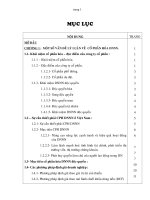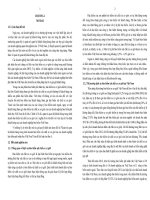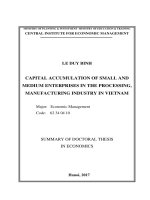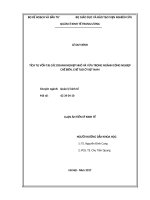Tích tụ vốn tại các doanh nghiệp nhỏ và vừa trong ngành công nghiệp chế biến, chế tạo ở việt nam (tt)
Bạn đang xem bản rút gọn của tài liệu. Xem và tải ngay bản đầy đủ của tài liệu tại đây (674.26 KB, 27 trang )
0
MINISTRY OF PLANNING & INVESTMENT MINISTRY OF EDUCATION & TRAINING
CENTRAL INSTITUTE FOR ECONNOMIC MANAGEMENT
LE DUY BINH
CAPITAL ACCUMULATION OF SMALL AND
MEDIUM ENTERPRISES IN THE PROCESSING,
MANUFACTURING INDUSTRY IN VIETNAM
Major: Economic Management
Code: 62 34 04 10
SUMMARY OF DOCTORAL THESIS
IN ECONOMICS
Hanoi, 2017
1
The thesis was completed at: Central Institute for
Economic Management (CIEM)
Supervisors: 1: Dr. Nguyen Dinh Cung
2: Assoc. Prof., Dr. Chu Tien Quang
Reviewer 1: Assoc. Prof., Dr. Tran Dinh Thien
Reviewer 2: Assoc. Prof., Dr. Ngo Quang Minh
Reviewer 3: Dr. Nguyen Van Than
The thesis will be defended before the institute-level thesis
evaluation council at the Central Institute for Economic
Management at…. on the date of……. 201…
The thesis can be found at:
Library of the Central Institute for Economic Management
National Library, Hanoi
1
INTRODUCTION
1. The urgency of the thesis
Recent studies show that the development of the
processing and manufacturing industry in Vietnam over the last
two decades mainly depends on micro and small businesses
rather than on the increase of the number of medium and large
enterprises. In fact, very few small-sized enterprises have
graduated and grown into medium-sized or large ones. One of
the reasons for this situation is the low accumulation of capital
in enterprises. Policy mechanisms have not been effective in
promoting the accumulation of capital in enterprises.
Small size and low level of capital are among the reasons
that explain why the majority of enterprises in the
manufacturing industry maintain very small scale of their
businesses. This hinders their ability to access to new, modern
technology, to improve productivity and competitiveness.
In order to solve the problem, the author has chosen the
topic "Accumulation of capital in small and medium-sized
enterprises in the processing and manufacturing industry in
Vietnam" as doctoral thesis topic, majoring in economic
management at the Central Institute for Economic Management.
2. The objective of the research thesis
The general objective of the thesis is to evaluate the
current status and
propose
measures to promote
the
accumulation of equity capital by the internal resources of
SMEs in the processing and manufacturing industry. Specific
objectives are the followings:
2
- Analyze the theoretical and practical basis for equity
accumulation in small and medium-sized enterprises in the
processing and manufacturing industry;
-
Assess
the
accumulation
of equity in small
and
medium-sized enterprises in the processing and manufacturing
industry since 2005 in Vietnam, the role of State, policies and
implementation of government policies in this process;
- Recommend viewpoints, solutions from the perspective
of policies, actions and supporting programs of the State.
3. Object and scope of research
Object of study: the role of the State and measures on
policies mechanism to promote SMEs in the processing,
manufacturing
industry
of
Vietnam to
accumulate
equity capital. Throughout the thesis, the connotation of capital
accumulation tobe studied is accumulation of equity capital.
Scope of research: (i) In terms of space: SMEs in the
processing and manufacturing industry in Vietnam; (ii) in terms
of time: accumulation of the equity capital of SMEs in the
processing, manufacturing industry in Vietnam from the year
2005 until now; perspective and vision to 2035; proposed
solutions until 2025; (iii) in terms of content: accumulation of
equity capital through internal resources of SMEs in the
processing and manufacturing industry in Vietnam.
4. Approach and methodology
4.1. Approach
The approach used in the thesis is from the perspective of
state management, i.e. the effects of the State role and
governmental agencies on the results, limitation and current
3
situation of the accumulation of equity capital of SME in
processing and manufacturing sectors.
Research under the thesis focused on the accumulation
of equity capital by internal resources of SMEs in the industry,
or the accumulation of capital from retained earnings to be more
specific.
4.2. Specific research methods
The specific research methods include the followings:
Descriptive statistics method to describe the current
situation of capital accumulation of small and medium
enterprises in the processing and manufacturing industry.
Analyze the correlations between equity capital of
SMEs with their competitiveness in the processing and
manufacturing industry.
Policy analysis, analysis of factors affecting the process
and the accumulation of equity capital in SMEs in the
processing and manufacturing industry.
The interpolation and extrapolation research methods in
order to make policy recommendations in accordance with the
object and content of research.
5. Contributions of the thesis
5.1 Contribution in academic and theoretical terms
The thesis systematically analyzes the theoretical and
practical basis of capital accumulation of small and medium
enterprises in the processing and manufacturing industry in
Vietnam from the level of all SMEs in the processing and
manufacturing industry, the role of the State in this process.
5.2. Contribution in practical terms
4
The thesis succeeds in proposing views and solutions to
accelerate the process of capital accumulation in SMEs in the
processing and manufacturing industry, especially the specific
measures which the State can implement.
6. Structure of the thesis
In addition to the introduction, conclusion, bibliography
and annexes, the thesis is divided into four chapters.
Chapter 1: Overview of researches and literature related
to
capital
accumulation
in
SMEs
in
processing
and
manufacturing industry.
Chapter 2: Theoretical basis for capital accumulation and
the role of the state in capital accumulation in SMEs in the
processing and manufacturing industry.
Chapter 3: The current situation of capital accumulation
and the role of the State in the capital accumulation of SMEs in
the processing and manufacturing industry in Vietnam.
Chapter 4: Orientation and measures to promote capital
accumulation in SMEs in the processing and manufacturing
industry in Vietnam in the coming period.
CHAPTER 1 - OVERVIEW OF RESEARCH RELATED
TO CAPITAL ACCUMULATION IN SME IN THE
PROCESSING, MANUFACTURING INDUSTRY
1.1. Overview of research published abroad related to
capital accumulation of SMEs
According to Adam Smith, output value depends on the
role of labor rather than wealth or money (labor value theory).
Alfred Marshall, in his principles of neoclassical economic
growth model in 1890, emphasized the role of technological
5
advances. Without denying the role of labor, Marshall said that
labor could be substituted by capital. According to Karl Marx,
capital accumulation is the process in which profits are
reinvested in the economy, and thus increasing the total amount
of investment. Michael Porter stressed that in order to truly
enhance national competitiveness, each country should rely on
the robust growth of enterprises, which are the nucleus of
microeconomics and are the foundation of the national
competitiveness. Matemilola in his pecking order theory says
that firms will look cautiously at the debt / equity ratio. Facing
an investment decision, an enterprise will consider the use of
retained earnings or borrowing or issuing additional shares.
Frank M.Z.& V.K. Goyal (2009) used data from US companies
during the period 1950 -2003 and demonstrated that when
profits soar, businesses will prioritize the accumulation of
capital and reinvest profits to increase its equity capital.
1.2.
Overview of research related to capital accumulation
of SMEs in the country
According to VCCI & USAID (2016), 97,6% of
enterprises in Vietnam are SMEs. The majority of SMEs grow
from small enterprises and household businesses. Dam Quang
Anh (2015) confirms that it is imperative to promote capital
accumulation for enterprises operating in the export sector.
Bach Van Mung et al. (2009) argues that "capital accumulation
is the process of internal development of a business over time
coupled with business results”. Dinh Truong Hinh et al. (2013)
note that "there are many reasons that explain why the
government should prioritize the acceleration of the process of
6
capital accumulation and the development of small business
into medium and medium sized enterprises, rather than focusing
on the formation of too many small enterprises which fail to
succeed and have to shut down from year to year". Nguyen
Dinh Cung et al. (2011) also state that "the lack of management
training and the sluggish capital accumulation are clearly major
constraint, hindering the improvement of the capacity of
Vietnamese enterprises to shift from a production-based
economy to a knowledge-based one".
CHAPTER 2 –THEORETICAL BASIS OF CAPITAL
ACCUMULATION AND THE ROLE OF STATE IN
CAPITAL ACCUMULATION OF SMES IN THE
PROCESSING AND MANUFACTURING INDUSTRY
2.1. Capital accumulation of small and medium enterprises
in the processing and manufacturing industry
2.1.1. Small and medium enterprises in the processing and
manufacturing industry
According to SME Promotion Law, SMEs have the
average number of employees covered by social insurance
schemes of less than 200 people and meet one of the following
two criteria: (a) total capital not exceeding VND 100 billion; (b)
total revenue of the preceding year not exceeding VND 300
billion. According to GSO, the number of SMEs in the
processing and manufacturing sector increased from 10,399 in
2000 to 63,244 in 2014.
7
2.1.2.
The nature, role and
accumulation
of
capital of
characteristics
small
and
of
the
medium-sized
enterprises in the processing and manufacturing industry
Equity capital of SMEs in the whole processing and
manufacturing industry, and the process of accumulation of
equity capital by internal resources of these enterprises is the
focus and scope of the thesis. Equity capital being studied is
measured by the aggregate equity capital of SMEs in the entire
processing and manufacturing industry over the years.
Equity capital accumulation is defined as the growth of
equity over the years by the internal resources of the business
itself. Self-accumulation of equity is made through changes in
internal capital resources of the enterprise such as chartered
capital, retained profits, appropriation of funds for reserve for
technical development and to supplement charter capital.
2.1.3. Content and method of capital accumulation of SME in
the processing and manufacturing industry
In the course of business, the equity capital of the
business may be supplemented by the profit of the business
operations, reserves of the enterprise, and by the difference in
the revaluation of assets.
Equity capital accumulation from internal resources is
to increase the capital based on the accumulated profits and
surplus value, converting part of the profits into capital. In the
course of operations, businesses will balance the accumulation
of equity by internal resources with the mobilization and use of
external capital.
8
2.1.4.
Criteria for assessing the impact of the role of the
State on the capital accumulation of SMEs in the processing
and manufacturing sector
The state plays an important role in the process of
accumulation of equity capital in the processing and
manufacturing
industry. The
effectiveness
of
the
implementation of these roles is reflected in the following
criteria:
(i) The ease of doing business demonstrated typically
by the Ease of Doing Business Index announced annually by the
World Bank (WB);
(ii) Level of informal costs: Informal costs are the costs
that businesses must spend in the process of production and
business and take the form of under-the-table costs.
(Iii) Effectiveness and efficiency of monetary, credit,
fiscal and tax policies. Monetary and credit policies whose
effectiveness of it is reflected by the bank lending interest rate.
Bank lending interest rates have direct impact to profitability of
SME in the manufacturing sector. At the same time, they affect
the ability and motivation to accumulate equity capital from
internal sources of SMEs in the processing and manufacturing
industry.
(iv) Effectiveness of business-nurturing policies through
favorable policies on taxes and payables to the State budget,
applicable to SME in the processing and manufacturing
industry. The policy on taxes and payable to State budget
applicable to SMEs in the manufacturing sector have a
9
direct impact on the capacity and the motivation to accumulate
equity capital of SME in the manufacturing industry.
2.2.
The role of the state in capital accumulation of
the small and medium-sized enterprises
2.2.1.
The state creates favorable policies, laws, and
business environment to enhance the capacity and motivation
of enterprises to accumulate capital
From the state management perspective, government
policies and practices have a significant impact on the profit and
profitability of small and medium enterprises in the processing
and manufacturing industry.
Business environment affects the accumulation of
capital in the processing and manufacturing industry in two
aspects. Firstly, the high cost of the business environment will
directly affect the profit and profitability of the business and
thus affecting the ability to accumulate capital through retained
earnings. Secondly, the favorable conditions of the business
environment will have a direct impact on the confidence of
current and potential investors in the processing and
manufacturing industry.
Informal costs have a direct impact to the process of
resource allocation and accumulation of capital of the business
in general and of SMEs in the processing and manufacturing in
particular. The state plays an important role in creating a low
informalcost,
transparent,
environment. Informal
charges
and
distort
clean
the
business
allocation
of
resources by the market, making the scarce resources such as
land, labor and especially capital not being allocated to the most
10
effective economic activities. Informal costs affect adversely
the motivation of business owners.
2.2.2. The state uses fiscal, monetary, credit, tax instruments
to leverage and stimulate the capacity and motivation to
accumulate owner's equity of the SMEs
Monetary and credit policies with its effectiveness
being reflected in bank interest rates have a direct impact to the
profitability of SMEs in the processing and manufacturing.
Tax policy and the obligations to pay to the state
budget has a direct impact to the profitability of the businesses
in the processing and manufacturing in Vietnam. When
profitable, SMEs usually have two basic choices. The first is to
pay dividends to shareholders (owners) and the second is to
retain whole or part of the profit in the form of retained
earnings. State policies can also influence these decisions and
choices of businesses.
2.2.3.
The state supports the vision and development
orientation to support the capital accumulation process of
SMEs
The state plays an important role in influencing SMEs'
vision and long-term business strategy. When SMEs become
aware of the need for long-term strategies and visions,
particularly through government policies, their motivation for
equity capital accumulation will be strengthened. The support
activities in the Government program support SMEs or in
programs to support the processing and manufacturing industry
and manufacturing have important implications for improving
the business strategy and vision of the owners of the business.
11
2.3. International experience on the role of the state in
promoting SME capital accumulation
Nordic countries such as Finland, Denmark and Sweden
are good examples for improving business environment
. Some countries such as the UK or the Netherlands
take measures to improve profitability and thus capacity to
retain profit of SMEs or to encourage businesses to reinvest to
expand. Singapore allows enterprises to enjoy tax rates of lower
than 5% (compared to the general tax rate of 17%) for a period
of 10 years, extendable by another 5 years, applicable to income
ploughed back to expand investment or business.
CHAPTER 3 – CURRENT SITUATION OF CAPITAL
ACCUMULATION AND THE ROLE OF THE STATE IN
CAPITAL ACCUMULATION OF SMES IN THE
PROCESSING AND MANUFACTURING INDUSTRY IN
VIETNAM
3. 1. Overview of the development of the processing and
manufacturing industry and small and medium enterprises
in the sector
3.1.1.
Overview of the development of the processing and
manufacturing industry in Vietnam
In 2016, industrial production was a bright spot in the
economy with a high growth rate of 7.5%. And in the 7.5%
growth of the industry in the year, it is worth noting that much
of the growth is attributed to the processing and manufacturing
industry.
The Ministry of Industry and Trade has set a target of
industrial production growth of 8-9% for 2017 and the
12
upcoming years. At the same time, the manufacturing and
processing industries are also oriented towards reducing
assembly and processing work. In addition, more efforts will be
put on enhancing the sophistication of the product, thus
contributing more to the global value chain.
These developments bring about great opportunities for
SMEs in the processing and manufacturing in Vietnam. At the
same time, they will also expose SMEs to huge challenges.
3.1.2.
Overview of the development of SMEs in the
processing and manufacturing industry in Vietnam
The number of SMEs in the processing and
manufacturing industry has increased rapidly from 10,399
enterprises in 2000 to 63,244 enterprises in 2014. Over the last
14 years, an average of 3,800 enterprises have been registered
annually in the processing and manufacturing industry. In 2006,
the number of micro and small enterprises was 21,926. By
2013, the number of small and micro enterprises is 54,220
enterprises.
3. 2. Analysis
of
current
situation
of
capital
accumulation of SMEs in the processing and manufacturing
industry in Vietnam
3.2.1
Current situation, results in capital accumulation of
SMEs in the processing manufacturing industry
13
Equity capital is the basis for enterprises to mobilize
other funds sources, making up the total capital and forming the
total assets for the enterprise.
Figure 3.7: Accumulation and growth of equity capital and
total capital of SMEs in processing, manufacturing industry
Source: Annual Enterprise Survey, the GSO (2015)
Enterprises in the processing and manufacturing sectors
are of very small scale. The average equity capital per
enterprise of the whole industry is merely VND 19.3
billion. Given the small scale of equity capital, it is extremely
difficult for these businesses to invest heavily in modern
technology, advanced production methods in order to improve
the competitiveness of the sector.
3.2.2 Limitations and challenges
facing processing
and
manufacturing SMEs in capital accumulation its impact to
competitiveness of the business and of the sector
Small
scale
of
equity
capital,
limited
capital
accumulation capacity of SMEs in the manufacturing industry
14
have a direct impact to the competitiveness of the whole
industry,
such
as
profitability,
value
added
and labor
productivity - the key factors presenting the competitiveness of
the processing and manufacturing industry in Vietnam in
general and of SMEs in the industry in particular.
Table 3.4: Some indicators on the relationship between
equity capital and competitiveness of SMEs in the
processing and manufacturing industry between 2005- 2014
2005
2007
Profit before tax / equity ratio (%)
Micro
enterprises
-4.18%
0.09%
Small business
4.08%
6.60%
Medium
enterprises
8.21% 13.17%
Large
enterprises
12.98% 17.31%
The value added / equity ratio (%)
Micro
41.4%
43.0%
enterprises
Small business
60.3%
58.7%
Medium
80.3%
74.6%
enterprises
Large
78.5%
76.8%
enterprises
2009
2010
2012
2014
-9.94%
6.27%
-3.12%
5.04%
-3.00%
1.96%
-3.59%
3.31%
15.67%
9.99%
8.50%
10.77%
18.66%
18.10%
16.61%
20.89%
111.8%
56.6%
36.7%
40.1%
58.0%
71.3%
64.0%
73.6%
63.2%
68.8%
63.1%
71.8%
65.0%
76.7%
90.3%
84.5%
Source: Author calculation on the basis of Annual Enterprise
Survey, the General Statistics Office (2015)
The
number
of
SMEs
in
the
processing
and
manufacturing industry, which is running at loss, is quite
large. Approximately 1/3 of enterprises in the processing,
manufacturing has been losing for years. Losses have negative
impact on capital accumulation capacity of SMEs.
15
Total
Manufacturing
Figure 3.13: Proportion (%) of SMEs in the processing and
manufacturing industry which were running losses and that
of the entire corporate sector
Source: VCCI (2016), Vietnam Business Annual Report 2015
3. 3. Current status of the role of the State in capital
accumulation in small and medium-sized enterprises in the
processing and manufacturing industry in Vietnam
3.3.1. The main result achieved
In
recent
years,
tremendous
efforts
have
been
implemented by the State to ensure the freedom to do business
of the people. This stimulates the entrepreneurial spirit of the
people. Most notable of all, the Enterprise Law, the Investment
Law has brought about a boom of SMEs in general and has
contributed directly to the capital accumulation process of
SMEs
in
the
processing
and
manufacturing
industry
manufacturing in particular.
3.3.2. Limitations and causes
However, there still exist limitations and weaknesses in terms of
the role of the State in order to further promote the process of
capital accumulation and development of SMEs in the
processing and manufacturing industry in Vietnam.
16
3.3.2.1. The business environment is not favorable withthe high
cost of doing business, thus hampering the capacity to
accumulate capital
High costs of doing business narrow the room for the use
of retained earnings to increase equity capital among
manufacturing SMEs. Business environment has direct impact
on the profitability of the businesses in the processing and
manufacturing industry. According to the Ease of Doing
Business Index in 2017 by the World Bank, Vietnam ranked 82
out of 190 economies with a score of 63.83 on a scale of 100.
3.3.2. 2. High informal cost simultaneously has strong impact
on the capacity and the motivation of capital accumulation
Figure 3.18. Percentage of firms that stated that their
businesses pay informal charges (%)
Source: Report on PCI in 2015, Chamber of Commerce and
Industry of Vietnam (2016)
Fact has shown that the informal costs have direct impact
on resource allocation, capital accumulation in enterprises in
general and enterprises of processing and manufacturing sectors
in particular. Informal costs distort the allocation of resources
17
by the market. Besides, informal costs shatter the dynamics,
motivation to invest of business owners. Informal costs erode
business confidence, thwart the idea of starting a business.
According to VCCI (2016), SMEs which paid informal
expenses has now become popular.
3.3.2.3. Ineffective financial, monetary and credit policies result
in high interest rates, tdirectly affecting the profitability and
retained earnings
High interest rates results in increased costs and reduced
efficiency of business; many enterprises suffered losses or
unable to pay debt. These directly affect the capital
accumulation
of
enterprises
in
the
processing
and
manufacturing sectors.
The average interest rate of
commercial banks
Figure 3.19: ROA and ROE of the enterprises in processing
and manufacturing industry and the average lending rate of
commercial banks
Source: "Annual Business Report 2015 Vietnam", VCCI and
"2015 Annual Report 2015 of the State Bank”, the State Bank.
18
3.3.2.4. Unfavorability of policies and regulations on taxes and
payable the budget does no promote capital accumulation of
SME in the manufacturing industry
Figure 3.20 shows the fact that in proportional terms,
the smaller the size of the enterprise is, the higher the burden of
taxes and payables to the State budget. Besides, the growth rate
of the taxes and other payables to the budget in the micro and
small enterprises is much faster than the improvement rate in
pre-tax profits of these enterprises.
Figure 3.20: Profit before tax, taxes and payables to the
budget of the enterprises in the manufacturing industry
19
Source: Annual Enterprise Survey, the GSO (2015)
This shows an imperative requirement for policies which
are aimed at nurturing businesses, and to provide more support
to operations of micro and small enterprises so they can
improve financial performance, creating preconditions for this
enterprise grow into a larger scale.
3.3.2.5. Effectiveness of Government programs to support the
vision, capacity and motivation for capital accumulation of
SMEs in the processing and manufacturing sectors
Long-term vision and business strategy of SMEs have
direct impacts on the motivation and decision to accumulate the
equity capital of the business owners. State policies have a
direct impact to the motivation and the decision to accumulate
capital of SMEs.
CHAPTER 4 – ORIENTATION AND SOLUTIONS TO
PROMOTE CAPITAL ACCUMULATION OF SMES IN
THE PROCESSING, MANUFACTURING SECTOR IN
VIETNAM IN THE COMING PERIOD
4.1. Context and the orientation of SME development in the
processing and manufacturing in Vietnam to the year 2035
4.1.1.
Context, development orientation of the processing
and manufacturing industry in Vietnam by 2025 and vision to
2035
Vietnam is persistent in the target of becoming an
industrialized country. The objective is that by 2035, the
industry sector in Vietnam will develop with the majority of its
sub-sector being equipped with advanced technology. The
quality products will meet international standards; participating
20
in global value chain; energy saving; fair competition in
internation integration.
4.1.2.
Orientation
for
the development of small
and
medium enterprises in the processing and manufacturing
sectors until 2035
The processing, manufacturing industry will gradually
shift from the growth model which is primarily based on
quantity to one which based on productivity, quality and
efficiency. Measures will be taken to promote the development
of industries and industrial products which have high added
value, and large export value. Businesses, especially SMEs in
the sector will be important pillars of the process of adjusting to
this growth model.
4.2. Viewpoints on the promotion of capital accumulation in
SMEs in the processing and manufacturing industry in
Vietnam
The development of the processing and manufacturing
industry in Vietnam and capital accumulation process must be
based on the following important viewpoints and principles:
The capital accumulation must be promoted by
enforcement mechanisms or polices which are consistent with
market principles, development rules and rules of resource
allocation of the market.
Measures to promote capital accumulation in the small
and
medium-sized
manufacturing
enterprises
industry
international commitments.
in
Vietnam
the
processing
should
conform
and
to
21
The capital accumulation of SMEs in the processing
and manufacturing sector should be in line with the ongoing
efforts to restructure the economy, improve the competitiveness
of the economy, green growth goals, sustainable development
objectives, enhancing corporate social responsibility for the
protection of the living environment and social security.
The capital accumulation process of SMEs in the
processing and manufacturing sector need to be linked
with efforts
to
improve
productivity,
efficiency,
competitiveness of the enterprises.
4.3. Solutions for
the
State to promote capital
accumulation of the small and medium-sized enterprises
4.3.1. Creating a policy, law, business environment to
facilitate the building of capacity and motivation for capital
accumulation of the enterprises
4.3.1.1. Improve business environment and the indicators of the
business environment
The State should take firm actions to implement
measures to reform the business environment, particularly in the
areas of compliance costs. Improving the ranking of Vietnam
position in the Doing Business will be accompanied with
business environment reforms measures. These will bring direct
benefits in terms of strengthening the capacity and motivation
to accumulate equity of SMEs in the processing and
manufacturing industry.
4.3.1.2. Accelerate reforms of administrative procedures;
enhance the quality of public services, building governance
integrity to reduce legal compliance costs and informal costs
22
The Government should promote the implementation of
actions aimed at building a transparent business environment,
Government
integrity,
and
low
informal
costs. Efforts
toeffectively implement the program of institutional reform,
reform of the operational quality of the public authorities, as
well as the action programs through Resolutions such as
Resolution 19, Resolution 35, etc. should be accelerated.
4.3.2. Effective use of monetary, credit policies, fiscal, tax
policy instruments to improve capital accumulation capability
and the motivation to accumulate equity of SMEs
4.3.2.1. Improving the effectiveness of the monetary and credit
polices to reduce interest rates and the cost of funds related to
bank loans
The State, through monetary and credit policies, and with
sound macroeconomic management measures, plays an
important role in maintaining inflation at a reasonable level.
The State can use monetary market policy instruments in order
to ensure the stability and soundness of the lending rate.
4.3.2.2. Implement policies to nurture enterprises, especially
SMEs in the processing and manufacturing industry through
policies to relax tax and payables to the State budget
Policies on income tax enterprises should also be adjusted
in order to encourage businesses to reinvest and plough back
profits in the production and business, thus improving the
capacity and level of financial autonomy of the business. These
are important precondition for renewing technology, machinery
and equipment.
23
4.3.2.3. Introduce tax
incentives to
encourage small
and
medium-sized enterprises to retain profits to supplement equity
capital and to reinvest profits to expand the business
Encouraging reinvestment of profits is extremely
important for any single business. Looking from the perspective
of the entire processing and manufacturing industry, this is even
more significant, particularly given the very low capital base of
the industry, the capacity of financial autonomy as well as the
modest technology and machinery of the sector.
4.3.3. Support the improvement in awareness about, vision in
capital accumulation and implementation of SME support
programs to support capital accumulation of SMEs
4.3.3.1. Enact and implement policies to raise awareness on the
importance of the accumulation of equity capital and of raising
the capital base of SMEs in the processing and manufacturing
industry
Awareness and understanding of the importance of the
accumulation of equity capital and strengthening the capital
base of SMEs in the processing, manufacturing industry is the
premise and basis for further action, policies and programs to
support manufacturing SME to accumulate its capital.
4.3.3.2. Implement
programs
to
support
SMEs
in
the
processing, manufacturing industry to build long-term vision
and strategies for sustainable development
SME support programs and programs supporting the
processing and manufacturing industry should focus on helping
SMEs to build up a long-term vision and strategy for the
development. The support activities should also aim to change









